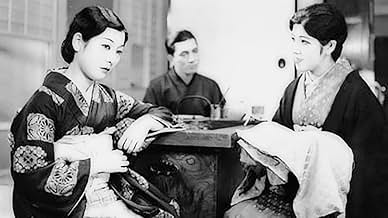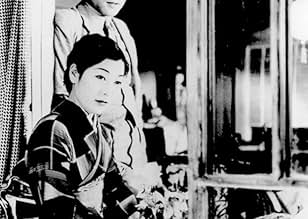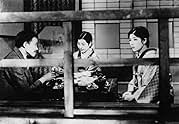IMDb RATING
7.5/10
624
YOUR RATING
When she reaches adulthood, a precocious young woman sets out to find her biological father, who, as her mother tells her, abandoned them for another woman.When she reaches adulthood, a precocious young woman sets out to find her biological father, who, as her mother tells her, abandoned them for another woman.When she reaches adulthood, a precocious young woman sets out to find her biological father, who, as her mother tells her, abandoned them for another woman.
- Awards
- 1 win total
- Director
- Writers
- All cast & crew
- Production, box office & more at IMDbPro
7.5624
1
2
3
4
5
6
7
8
9
10
Featured reviews
A Thumbnail Portrait reveals a Masterpiece
A young middle-class woman sets out to a remote mountain village in Nagano to bring her estranged father back to Tokyo where his presence is needed to fulfill some pressing social obligations - chief among them a meeting between her parents and the father of her intended bridegroom. Her own father, though, would rather stay with his common law wife - a former geisha - and their two children despite their relative poverty and "disgraceful" circumstances. Father is happy prospecting for non-existent gold in the rivers of his adopted rural home, while his selfless and devoted 'wife' ekes out a living as a hairdresser.
Back in Tokyo, Etsuko, the abandoned wife and Kimiko's self-absorbed and pretentious mother publishes mournful haiku for her long lost husband and patiently waits for his return. Will Father return to his "rightful" place with his "legitimate" family or will he forsake them for his mistress and their two children? Naruse Mikio's comic and heart stirring melodrama 'Wife! Be Like a Rose' offers a surprising and refreshing take on familiar Japanese themes on 'self-sacrifice' and filial devotion.
Back in Tokyo, Etsuko, the abandoned wife and Kimiko's self-absorbed and pretentious mother publishes mournful haiku for her long lost husband and patiently waits for his return. Will Father return to his "rightful" place with his "legitimate" family or will he forsake them for his mistress and their two children? Naruse Mikio's comic and heart stirring melodrama 'Wife! Be Like a Rose' offers a surprising and refreshing take on familiar Japanese themes on 'self-sacrifice' and filial devotion.
Poems, prospector
I have no use for melodrama dished out straight. This is because my stance is that even the most ordinary life on the planet is experienced as a deep personal drama, so dramatizing on top of that produces a ludicrous, myopic effect. As though a particular dramatic chain of events is somehow more revealing, more insightful about what it means to live, so needs to be magnified for us to notice.
What I'm looking for instead in a film like this is how deeply it is prepared to acknowledge the fabrication of its drama and contrivance. How far it can imagine the controls to go in any given situation and does it offer a glimpse of bare soul beyond them.
Unlike previous films by Naruse, this one is a welcome sight. The main idea is that we are set up to imagine the story to be a certain way, a father has abandoned wife and daughters to shack up with a geisha, so we assume he's a scoundrel, the mistress a scheming succubus, but when we finally travel to meet him, the situation turns out to be completely different. The story as we heard it from the mother, and is generally believed to be true in that circle, was a myopic (melodramatic) fabrication. The father turns out to be a very decent and caring family man.
So far this would make for powerful irony exposing unpredictable life beneath the organized tapestry of fictions, deceitful in their haste to imagine drama. The woman is not a geisha, which would have been the assigned melodramatic role, but a hard-working hair dresser striving to raise a family.
Since both these people are not who we believed were going to be, and since the sole reason the father was sought after in the first place was to fulfill his part in social circumstances, this begs the question. How much of anyone else we meet and believe to know in context of those circumstances, is really that person?
But there is another point that really elevates this in my eyes. There is no clue that the mother has calculated to deceive, which would have been another ordinary trope of melodrama. She's just a lonely, hopelessly romantic creature. She spends her time writing poetry, funneling life she does not live into idle ruminations about living it. The intention I believe is to counterpoint this against the father's main activity: prospecting for gold in the hills, perhaps equally futile time spent but hard work spending it.
Melodrama about the dissolution of the same is what we have, marvelously so. What Naruse doesn't seem to notice, is that he replaces this with another melodrama in this second family that is the reverse of the first. Cessation is only half-accomplished but for the time this is enough.
What I'm looking for instead in a film like this is how deeply it is prepared to acknowledge the fabrication of its drama and contrivance. How far it can imagine the controls to go in any given situation and does it offer a glimpse of bare soul beyond them.
Unlike previous films by Naruse, this one is a welcome sight. The main idea is that we are set up to imagine the story to be a certain way, a father has abandoned wife and daughters to shack up with a geisha, so we assume he's a scoundrel, the mistress a scheming succubus, but when we finally travel to meet him, the situation turns out to be completely different. The story as we heard it from the mother, and is generally believed to be true in that circle, was a myopic (melodramatic) fabrication. The father turns out to be a very decent and caring family man.
So far this would make for powerful irony exposing unpredictable life beneath the organized tapestry of fictions, deceitful in their haste to imagine drama. The woman is not a geisha, which would have been the assigned melodramatic role, but a hard-working hair dresser striving to raise a family.
Since both these people are not who we believed were going to be, and since the sole reason the father was sought after in the first place was to fulfill his part in social circumstances, this begs the question. How much of anyone else we meet and believe to know in context of those circumstances, is really that person?
But there is another point that really elevates this in my eyes. There is no clue that the mother has calculated to deceive, which would have been another ordinary trope of melodrama. She's just a lonely, hopelessly romantic creature. She spends her time writing poetry, funneling life she does not live into idle ruminations about living it. The intention I believe is to counterpoint this against the father's main activity: prospecting for gold in the hills, perhaps equally futile time spent but hard work spending it.
Melodrama about the dissolution of the same is what we have, marvelously so. What Naruse doesn't seem to notice, is that he replaces this with another melodrama in this second family that is the reverse of the first. Cessation is only half-accomplished but for the time this is enough.
Title is deceptive
For years I avoided seeing this film because I thought the title implied it was a sexist drama about women forced to be submissive. Finally seeing it now, a more accurate title would be More than One Way to be a Wife. This short film (approximately 75 minutes) conveys more about relationships than most American films do in two hours. And it is still relevant, now 82 years after it was released. How many current films will still be relevant in 82 years? Not many.
I highly recommend this film to anyone interested in marriage and relationships and in the misunderstandings that can occur when people are not honest with each other about who they are and what they need to be happy in life.
I will not reveal more about the plot, just let it unfold and see for yourself....
I highly recommend this film to anyone interested in marriage and relationships and in the misunderstandings that can occur when people are not honest with each other about who they are and what they need to be happy in life.
I will not reveal more about the plot, just let it unfold and see for yourself....
Softly rich and satisfying; a fine drama
I admit I find this to be a little uneven, and it's possible that my opinion stems in part from an inability to fully appreciate the film-making and storytelling sensibilities that figure into it. (By the same token, though relatively rare, I believe it is unfavorable when the lasting value of a picture is in some measure dependent on cultural context.) One way or another, there are points where the dialogue and scene writing come across as rather rigid and unnatural - and for that matter, Naruse Mikio's direction as well - and slivers of tonal discrepancy also curiously raise their head, even in Ito Noboru's complementary score. In fairness, these issues diminish, if not resolve entirely, as the plot develops beyond the exposition in the first third that establishes characters, their relationships, and the scenario. It's still unfortunate, though, that with a shorter runtime of only seventy-four minutes, those issues consequently feel more pronounced. However worthy 'Wife! Be like a rose!' may or may not otherwise be, to some small extent it doesn't necessarily meet its full potential.
Yet thankfully such matters represent but a fragment of the movie, and regardless of how much we might scrutinize it this is, overall, quite strong, enjoyable, and satisfying. Though without specific examples coming to mind I'm reminded somewhat of some contemporary fare out of Hollywood or England in how the story initially seems ready to focus on Kimiko's relationship with boyfriend Seiji, but instead shifts to the more dramatic focus of her family's structure, with father Shunsaku having left her and mother Etsuko years ago. This is probably the more interesting story, anyway, for through it we see the complexities of relationships between men and women, not to mention the complexities of individual people; the false assumptions that we make about people based on limited information, and the difficulties of reconciling our hopes for the future with the realities of the past and present; and more. This carries itself with a soft tone, declining to heavily emphasize any beat or idea, but that works perfectly in the film's favor as the tale and its themes are allowed to speak for themselves. And so they do. It's worth further observing that in 'Wife! Be like a rose!' we see a quite modern vision of Japan, with Kimiko moreover being an intelligent, independent-minded young woman, and writing that denotes Shunsaku's culpability - unlike a lot of contemporary works in which Men Never Do Any Wrong unless they were outright villains - while also recognizing the complicated situation in which the characters find themselves. I don't think the title is impeccable, yet Naruse's writing is generally superb as he adapts Nakano Minoru's play.
In all other ways this is splendidly well made, with Suzuki Hiroshi's cinematography striking me as especially smart and dynamic. As the feature maintains a soft, reserved tenor, I think the cast are given more of an opportunity to meaningfully demonstrate their nuanced range and emotional depth, and from one to the next the performances are excellent. By all means, some roles are larger than others, yet I'm equally pleased with all the actors, from Chiba Sachiko (Komiko), Ito Tomoko (Etsuko), and Fujiwara Kamatari (uncle Shingo), to Hanabusa Yuriko (Oyuki), Maruyama Sadao (Shunsaku), and Horikoshi Setsuko (Shizuko). The filming locations are lovely, and the sets no less so; the costume design is sharp and fetching. Truthfully, while I'm of the mind that there are some shortcomings, when all is said and done I think the strengths this boasts well outshine any weaker spots, and the impression I'm left with is of a quietly rich, rewarding drama. One would be remiss not to observe this to have seemingly been one of Naruse's first sound pictures, and one of the first Japanese pictures to have made its way to the United States, and from the outside one might wonder if it has any further value to offer ninety years later. I'm happy to say that as far as I'm concerned it very much does, and I'm glad to give a warm, hearty recommendation for 'Wife! Be like a rose!'
Yet thankfully such matters represent but a fragment of the movie, and regardless of how much we might scrutinize it this is, overall, quite strong, enjoyable, and satisfying. Though without specific examples coming to mind I'm reminded somewhat of some contemporary fare out of Hollywood or England in how the story initially seems ready to focus on Kimiko's relationship with boyfriend Seiji, but instead shifts to the more dramatic focus of her family's structure, with father Shunsaku having left her and mother Etsuko years ago. This is probably the more interesting story, anyway, for through it we see the complexities of relationships between men and women, not to mention the complexities of individual people; the false assumptions that we make about people based on limited information, and the difficulties of reconciling our hopes for the future with the realities of the past and present; and more. This carries itself with a soft tone, declining to heavily emphasize any beat or idea, but that works perfectly in the film's favor as the tale and its themes are allowed to speak for themselves. And so they do. It's worth further observing that in 'Wife! Be like a rose!' we see a quite modern vision of Japan, with Kimiko moreover being an intelligent, independent-minded young woman, and writing that denotes Shunsaku's culpability - unlike a lot of contemporary works in which Men Never Do Any Wrong unless they were outright villains - while also recognizing the complicated situation in which the characters find themselves. I don't think the title is impeccable, yet Naruse's writing is generally superb as he adapts Nakano Minoru's play.
In all other ways this is splendidly well made, with Suzuki Hiroshi's cinematography striking me as especially smart and dynamic. As the feature maintains a soft, reserved tenor, I think the cast are given more of an opportunity to meaningfully demonstrate their nuanced range and emotional depth, and from one to the next the performances are excellent. By all means, some roles are larger than others, yet I'm equally pleased with all the actors, from Chiba Sachiko (Komiko), Ito Tomoko (Etsuko), and Fujiwara Kamatari (uncle Shingo), to Hanabusa Yuriko (Oyuki), Maruyama Sadao (Shunsaku), and Horikoshi Setsuko (Shizuko). The filming locations are lovely, and the sets no less so; the costume design is sharp and fetching. Truthfully, while I'm of the mind that there are some shortcomings, when all is said and done I think the strengths this boasts well outshine any weaker spots, and the impression I'm left with is of a quietly rich, rewarding drama. One would be remiss not to observe this to have seemingly been one of Naruse's first sound pictures, and one of the first Japanese pictures to have made its way to the United States, and from the outside one might wonder if it has any further value to offer ninety years later. I'm happy to say that as far as I'm concerned it very much does, and I'm glad to give a warm, hearty recommendation for 'Wife! Be like a rose!'
10Red-125
Excellent film from pre-WWII Japan, but unavailable on DVD
The Japanese film "Tsuma yo bara no yô ni" was shown in the United States with the title, "Wife! Be Like a Rose!" or "Kimoko" (1935). It was directed by Mikio Naruse.
This film was the first major film directed by Naruse, but it's clear that he had already mastered the art of cinema. Naruse's films are typically melodramas about middle-class or working-class people. His movies, like this one, are often tinged with sadness.
Sachiko Chiba plays Kimiko Yamamoto, a young office worker who has a modern outlook and dresses in western fashion. She lives with her mother, who is a talented poet. However, her mother is depressed, and most of the poems she writes are about her husband, who has left the family and moved to the countryside.
Kimiko travels to her father's village, in order to convince him to return home to his wife and to her. When she meets with her father, she learns that matters are not at all what they had seemed.
I wish I could write more about this very interesting plot, but the enjoyment of this film depends upon the unexpected events that occur during and after Kimiko's trip. I have no intention of spoiling the movie for those reading this review.
We saw this film at the Dryden Theatre, in an original 35mm print that is owned by The George Eastman Museum. It's hard to believe that this movie is apparently unavailable in the U.S. on DVD. In fact, I hesitated to review it, because what's the point of a review if no one can see the film? However, the movie was excellent, and possibly it will play in a Naruse retrospective in your location. If so, don't miss it!
Note: In 1937, two years after the film was made, Naruse married the star of the film--Sachiko Chiba. Sadly, life followed art, and they were divorced three years later.
This film was the first major film directed by Naruse, but it's clear that he had already mastered the art of cinema. Naruse's films are typically melodramas about middle-class or working-class people. His movies, like this one, are often tinged with sadness.
Sachiko Chiba plays Kimiko Yamamoto, a young office worker who has a modern outlook and dresses in western fashion. She lives with her mother, who is a talented poet. However, her mother is depressed, and most of the poems she writes are about her husband, who has left the family and moved to the countryside.
Kimiko travels to her father's village, in order to convince him to return home to his wife and to her. When she meets with her father, she learns that matters are not at all what they had seemed.
I wish I could write more about this very interesting plot, but the enjoyment of this film depends upon the unexpected events that occur during and after Kimiko's trip. I have no intention of spoiling the movie for those reading this review.
We saw this film at the Dryden Theatre, in an original 35mm print that is owned by The George Eastman Museum. It's hard to believe that this movie is apparently unavailable in the U.S. on DVD. In fact, I hesitated to review it, because what's the point of a review if no one can see the film? However, the movie was excellent, and possibly it will play in a Naruse retrospective in your location. If so, don't miss it!
Note: In 1937, two years after the film was made, Naruse married the star of the film--Sachiko Chiba. Sadly, life followed art, and they were divorced three years later.
Did you know
- TriviaThis was possibly the first fictional feature film from Japan to be distributed in the United States, under the name "Kimiko."
- ConnectionsRemade as Koi ni mezameru koro (1969)
Details
- Runtime
- 1h 14m(74 min)
- Color
- Sound mix
- Aspect ratio
- 1.37 : 1
Contribute to this page
Suggest an edit or add missing content






















